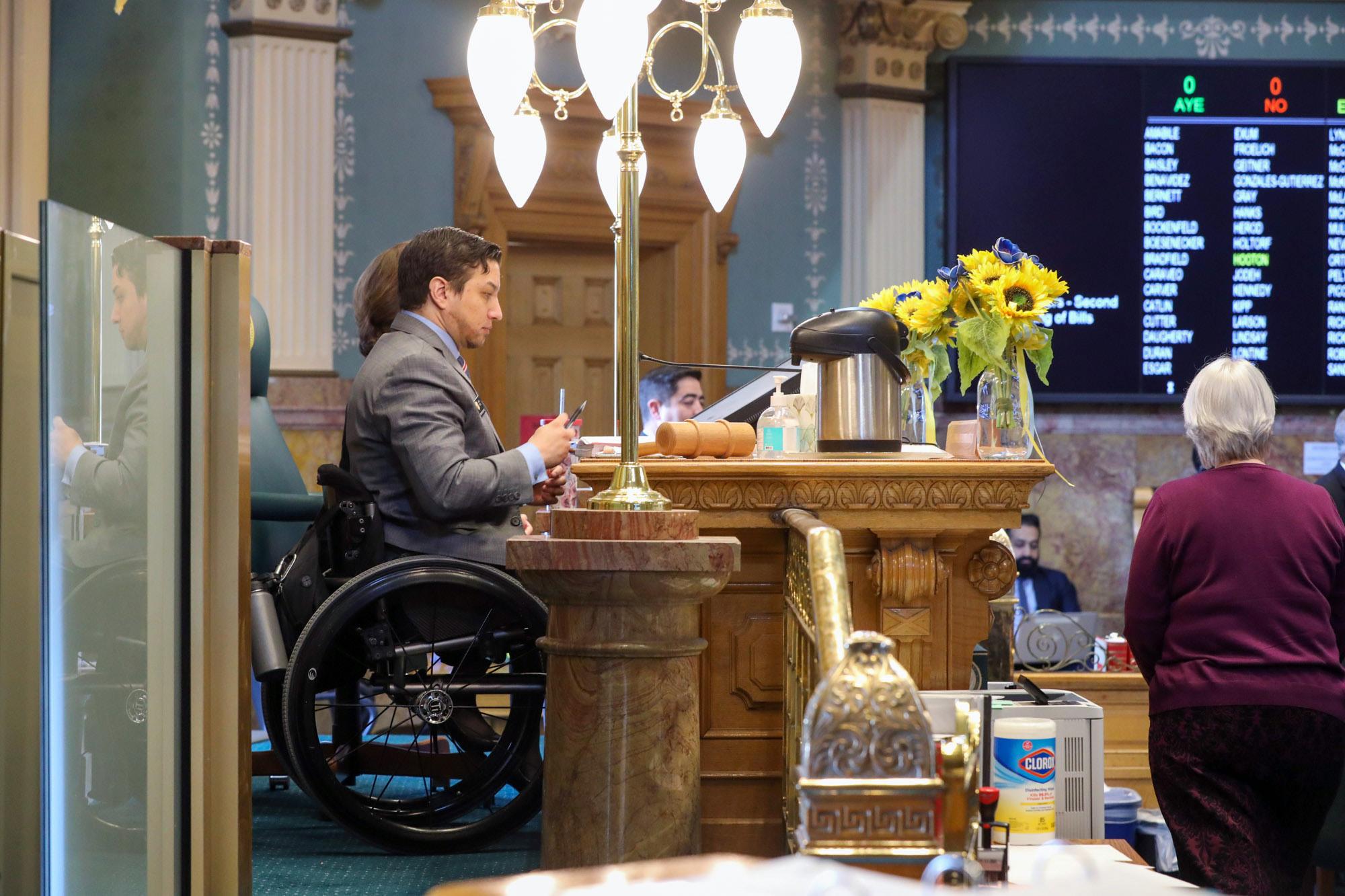
Running for office, especially for local office, can require a lot of on-the-ground campaigning. Many candidates have to go door-to-door just to get the signatures needed to put their name on the ballot.
But for political hopefuls who use a wheelchair or have a variety of other disabilities, that kind of approach is often literally out of reach.
“If you think about the way the houses are built, and I'm in a wheelchair — every home has stairs or steps going up to it. I can't reach the doorbell. I can't reach the door to knock on it,” said Democratic state Rep. David Ortiz of Littleton.
To get on the ballot, Ortiz skipped the petitions and instead used Colorado’s caucus process, convincing enough of his supporters to show up in person at local Democratic gatherings to move his candidacy forward.
This year, Ortiz is sponsoring House Bill 1067, which seeks to preserve this type of ballot accessibility for candidates with disabilities. Under the bill, any attempt to remove the caucus option would constitute discrimination against those living with a disability.
“It defines caucus as the only truly accessible way that we currently have to get on the ballot,” said Ortiz.
In 2018, Colorado voters overwhelmingly chose to move from caucuses to primaries as the route to pick presidential candidates, but the caucus process still exists for down ballot races.
There is not currently any significant effort to get rid of caucuses, but HB-1067 is meant to head off the possibility of that idea gaining traction. Last session a Republican bill that would have eliminated the state's caucus system and required all primary candidates to petition on to the ballot failed. Opponents of the caucus system say it gives too much power to grassroots party members and can disadvantage more moderate candidates.
Now in his fourth year in the legislature, Ortiz has decided not to seek reelection to his statehouse seat. While he is the first Colorado lawmaker to use a wheelchair, he hopes he isn’t the last; he wants to open the pathway for more people with all different types of disabilities to hold office.
“When I was elected, they had to renovate this building because I could physically not do my job,” he said of the state capitol, which added a ramp and other modifications so Ortiz could get to his desk in the House chamber.
That lack of accessibility, Ortiz said, is a reminder of how few people who use wheelchairs or have other disabilities make it to elected office. “I'm not saying it's malicious, but it is systemic and we need to make sure that we're not making it worse.”
Democratic Sen. Faith Winter of Broomfield is another of the bill’s sponsors. She said for democracy to work best, people from every background must be represented.
“We are not asking for unreasonable accommodations… Accessibility and access to the ballot is essential for democracy,” said Winter. “This is a vote about protecting democracy.”
Winter did agree to add an amendment to the bill from Republican Sen. Larry Liston of Colorado Springs to increase the length of time candidates who petition on to the ballot have to gather signatures. She said that could also help with accessibility.
“I personally have pulmonary hypertension, which is often called the invisible disability. It makes it harder for me to breathe. I have 70 percent of the lung capacity that all of you have,” she said to her Senate colleagues during a floor debate. “So as you go out collecting petition signatures, I have 70 percent of that capacity.”
Liston signed onto the bill as a sponsor because the amendment was added. “It will help all people access the ballot,” he said.
While no groups signed up to testify against the bill in committee, some Republican lawmakers did vote against it. Many are concerned by a provision that requires the political parties make sure people have a way to participate remotely in the caucus process.
“(It’s) an invitation to all sorts of lawsuits,” said Republican Sen. Bob Gardner of Colorado Springs, warning his colleagues that requiring there to be accommodations for remote participation could cause more problems than it solves. “It creates confusion in the electoral process."
Republican Sen. Mark Baisley of Roxborough Park believes ensuring ballot access shouldn’t require legislation, but instead can be implemented “via common sense and with a big heart for people who need additional accommodation.”
On the other side, Democratic Sen. Jessie Danielson of Wheat Ridge called backing the bill a “no-brainer.”
The bill is near the end of its legislative journey. If House lawmakers also accept Liston’s amendment, it will head to the governor’s desk. If they don’t, then a conference committee will try to find a compromise.








